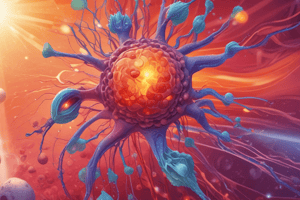Podcast
Questions and Answers
What are the two major lines of defense in the immune system?
What are the two major lines of defense in the immune system?
- Primary and Secondary Immunity
- Non-specific (Innate Immunity) and Specific (Adaptive Immunity) (correct)
- Inflammatory and Antigenic Immunity
- Cellular and Humoral Immunity
What did Ehrlich propose in his Selective Theory?
What did Ehrlich propose in his Selective Theory?
- Cells in the blood were not involved in the immune response
- Cells in the blood expressed a variety of receptors called side-chain receptors that could bind to infectious agents and inactivate them (correct)
- Cells in the blood produced antibodies specific to each pathogen
- Cells in the blood underwent mutation upon exposure to foreign antigens
What does immunity refer to?
What does immunity refer to?
- The body's ability to regulate temperature
- The body's ability to recognize foreign materials
- The body's ability to produce white blood cells
- The body's ability to fight off harmful micro-organisms (pathogens) that invade it (correct)
What did the Instructional Theory refine Ehrlich's model into?
What did the Instructional Theory refine Ehrlich's model into?
Which components are part of the immune system according to the text?
Which components are part of the immune system according to the text?
Flashcards are hidden until you start studying
Study Notes
Major Lines of Defense in the Immune System
- The immune system has two primary lines of defense: innate immunity and adaptive immunity.
- Innate immunity provides immediate, non-specific defense mechanisms while adaptive immunity develops a specific response to pathogens over time.
Ehrlich's Selective Theory
- Paul Ehrlich proposed the Selective Theory, suggesting that specific substances (antigens) in pathogens trigger the production of corresponding antibodies.
- This theory emphasizes that the body can produce a tailored immune response based on the specific antigen encountered.
Definition of Immunity
- Immunity refers to the body's ability to resist and eliminate infectious agents through a robust defense system.
- It is characterized by the recognition and memory of previous encounters with pathogens, allowing for faster responses in future infections.
Instructional Theory Refinement
- The Instructional Theory builds upon Ehrlich's idea by refining the model to include the role of cellular structures and their interaction with antigens.
- This theory emphasizes that the interactions between antigens and immune cells are critical for the development of immunity.
Components of the Immune System
- Key components of the immune system include white blood cells (leukocytes), antibodies, bone marrow, thymus, lymph nodes, and spleen.
- Each component plays a distinct role in identifying and combating infections, as well as in the overall immune response.
Studying That Suits You
Use AI to generate personalized quizzes and flashcards to suit your learning preferences.




